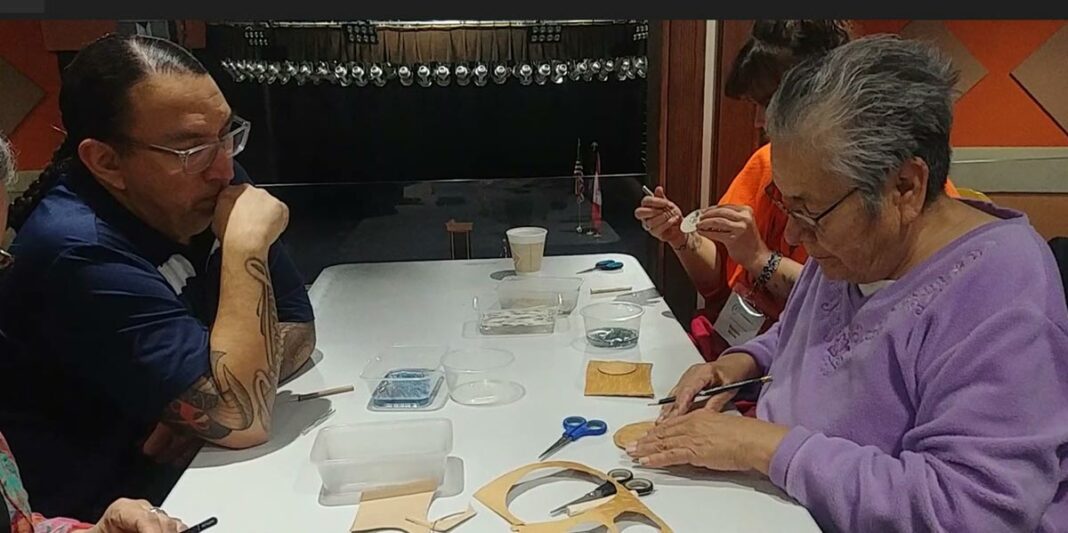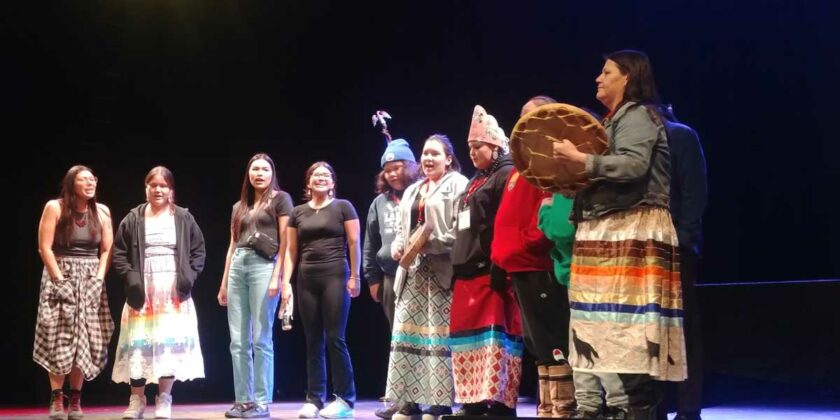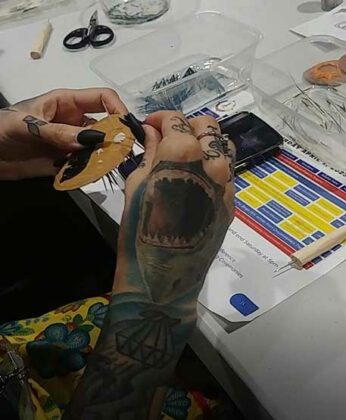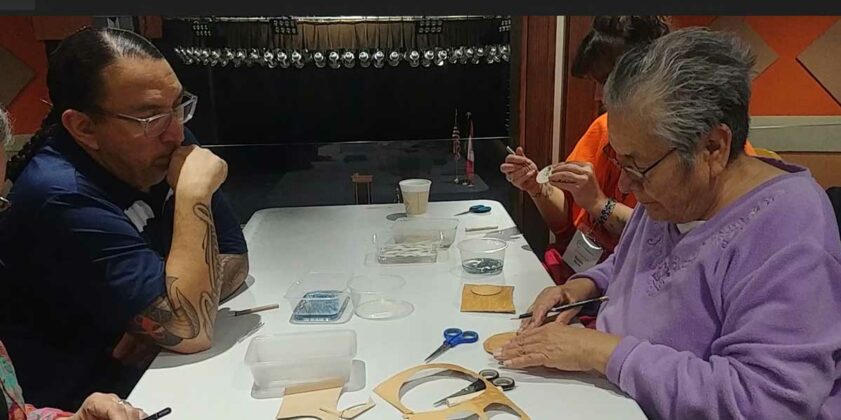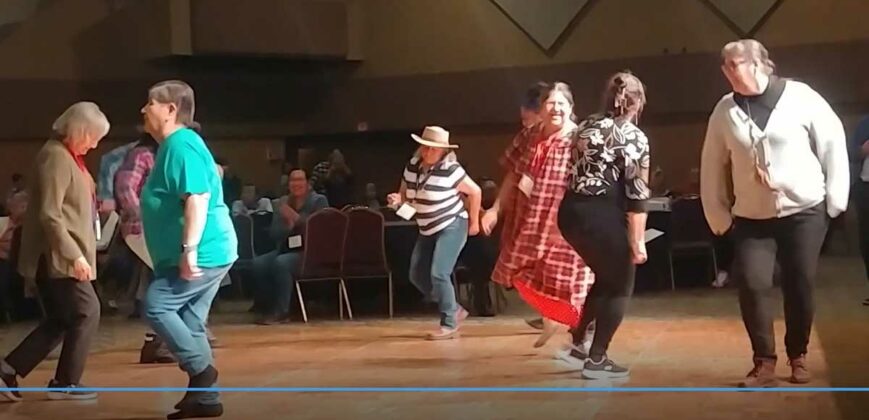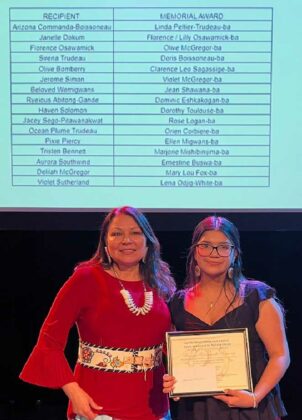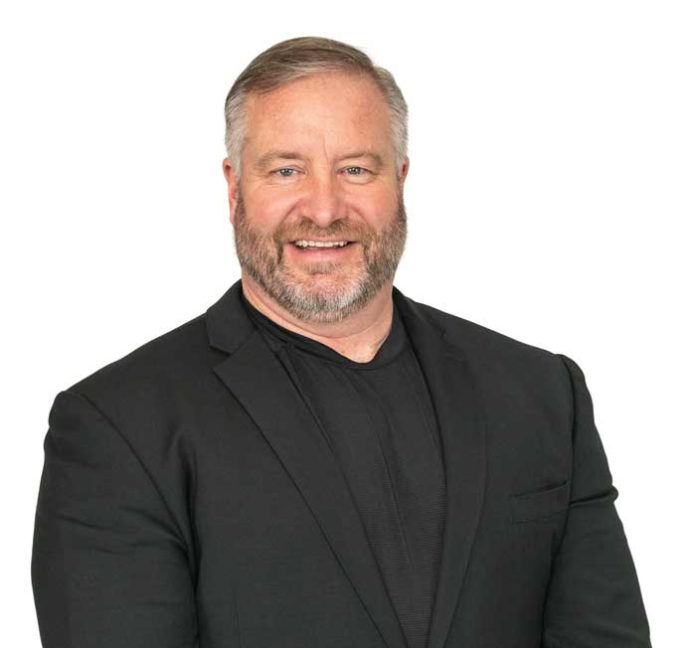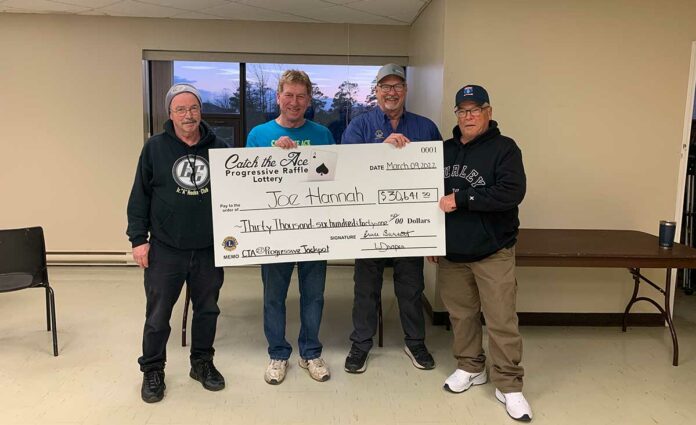SAULT STE. MARIE, Mich.—In conjunction with National Indigenous Languages Day on Friday, March 31, 2023, a day Canada sanctioned to celebrate and honour Indigenous languages in Canada, the decade from 2022 to 2032 was also designated to promote the use of Indigenous languages world-wide as celebrated recently at the Keewadin Casino in Sault Ste. Marie, Michigan.
On behalf of Anishinaabemowin Teg organizing committee, in its 29th year of gathering, President Elizabeth (Liz) Osawamick stated, “We are at a critical time in our language, and it is essential to work together to bridge the gaps between our Elders and young people to respectfully transfer and sustain our Anishinaabe ways of knowing and speaking that has been gifted from our Creator Gzhemnidoo. We certainly hope that this gathering will spark a light about the value of the beautiful sound within our language to further develop and enhance the necessary mentorship amongst our Elders, children, and youth uphold our sacred pathway as Anishninaabeg.”
According to Statistics Canada since comparable data started being collected in 1991, approximately one in eight Indigenous people, out of 237,420 people surveyed, reported they could speak well enough to conduct a conversation in one of the remaining 70 distinct Indigenous languages in 2021.
The numbers continue and may not be viewed as a saving grace, but the fact remains, two-thirds of First Nations people who speak an Indigenous language in Canada live on reserve. First Nations people living on reserve (39 percent) were almost five times more likely to speak an Indigenous language compared to those living off reserve (eight percent).
Despite being tasked with keeping the Anishnaabe language alive, many Elders, language keepers and community members are continuing to heal from the impact of residential schools and intergeneration trauma caused by genocide, colonialism, linguistic imperialism, new diseases, forced relocation, upset of Indigenous economic, social and political systems.
All of the above, including the loss of language and culture, has led to devasting effects on mental health, substance abuse and suicide has led to Anishinaabemowin Teg 2023 conference theme, “Naadmaadidaa Ji Zhaabwitoying Gididnowewinaa: Let’s Help One Another Save the Sound of our Language.”
This matches the words of encouragement by Ojibwe language teacher Barbara Nolan, originally from Wiikwemkoong now living in Garden River First Nation “Anishinaabemtwaadaa Gidabinoojiinminaanig Enso Giizhigak! Let’s speak the language to our children daily!” Ms. Nolan is grateful to have survived the attempts by Canada’s Indian residential school system to brainwash and obliterate her Anishnaabe language from her mind and spirit. Along with her current position as Language Commissioner, she currently hosts a training program to encourage fluent speakers to achieve a Language Certificate, Level 1 Immersion Instructor. (manager.anishinaabemowin@gmail.com)
Ms. Nolan, like many before her and after her, has strived to revitalize our Anishnabek language. An honourable roll call of past Anishnaabemowin speakers was held in conjunction with the speeches delivered by the youth participants.
The founding members mission states: “Wii-mshkaabooying wii-temgak, Waa-zhaang maamiwiiying ezhi-Anishinaabeying wii-waabdooweying ezhibgchi-piitebdaagok Anishinaabe’aadiziwin miinwaa enweying kina go wii-minawaabijitooying miinwaa giwi bjinag waabiyaajig. We will provide a stable foundation and the place and environment with resources that allow Anishinaabe the chance to come together to maintain culture and language for ourselves and future generations.”
Over the course of two days, the Anishinaabewin Teg conference utilized many approaches to ensure language reclamation, including sharing immersion strategies to curriculum and resource development, teacher training initiatives, evaluation and research.
Conference participants had an opportunity to choose from a host of workshops designed to educate, play, sing and hear the distinct sounds and ancient words of the Anishnaabe language.
Most participants shared appreciation for the time to gather, to celebrate the ongoing efforts of those who continue to protect, educate and preserve the Anishnaabek language and uplifting those on the path of learning to listen and speak.
Marie Gaudet Youth Program Coordinator was grinning from ear-to-ear as she listened to little Janelle Dokum from Wiikwemkoong Unceded Territory deliver her award-winning speech during Friday night’s Memorial Scholarship Banquet held in the DreamMaker’s Theatre. “For me it was a conference highlight that shone the spotlight on young people from grade school to high school. And I had the honour and privilege to witness the moment,” she said.
Members of the Wikwemkoong Unceded Territory Anishinaabemowin Department presented their community-based language revitalization program that has been in operation since 2019 and is responsible for increasing language fluency, preserve and archive the language, and develop Web-based resources. Providing testimony was Lorraine Bebamikwe who shared her heartfelt story about how she had not attempted to speak her language since the age of 15 and the death of her grandmother, her treasured Nokomis. “After many years of silence, I began to pray and seek to be in circles where the language was spoken. I even went to sacred places like the ancient rock paintings of our ancestors. Finally, one day I found my voice and have not stopped my need and desire to speak the language. I encourage everyone to start a language journal, document your progress to give yourself encouragement,” she said.
Co-presenter Henry Pitawanakwat stated, “We need to back people like Lorraine, encourage her and not criticize, as that treatment only discourages others from trying to find their voice. I am so proud of Lorraine; she has come a long way,” he shared.
Using various approaches to engage language learners at different levels seems to be a magic ingredient as witnessed in the craft workshops. Participants learned words to identify items, materials and tools utilized to make dolls, mitts, beading and porcupine quill demonstrations. Five artisans were featured: Myna and Theodore Toulouse, bark and quill work; George Martin, beading peyote stitch; Patricia Osawamick, fleece mitts; Georgina Toulouse, doll ‘daminowaagan’ making.
“Using the language is our most powerful tool for sharing and growing our connection to the language and each other,” says Phyllis Williams. She has been sharing her passion for the language for decades, working as a court interpreter, hosting talk shows as well as advisor on several language learning applications. Ms. Williams believes in sharing lived experiences and the gift of storytelling to share the power of medicine and language.
Like Ms. Williams, Mary Maanii Wemigwans views the use of language as healing and connecting to the land. Her workshop centred on the theme of the conference “saving the sound of our language.” She discussed the importance of pronunciation with Anishinaabemowin and the importance of identifying and teaching intonation, tone and stressed patterns with Anishinaabemowin and how to describe these terms within the language.
Maanii has been instrumental in the formation and support to Serpent River First Nation youth Quinn Meawasige and Taryn Bobiwash and the Nimkii Youth Collective, who have formed an Anishnaabe land-based language and culture camp. Ms. Meawasige shared an overview and practices his group uses at the off-grid, year-round culture camp where reconnecting with land and waterways are utilized for teaching purposes.
A gathering of this magnitude would not be complete without bestowment of honour to an individual who has gone beyond the limits to ensure language survival. This year’s recipient of the 2023 Lifetime Achievement Award was presented to Dr. Mary Ann Corbiere, a longstanding Anishnaabemowin educator from Wiikwemkoong Unceded Territory. Her efforts to support revitalization of the language include creating an extensive curriculum for use at the post-secondary level and compiling a more comprehensive dictionary.
Adding to this dictionary will be done by the database expert at Carleton University. Once all the information she has documented from over 60 workshops has been added, along with her doctoral work in theory, policy studies in education, translation contracts from her own and other communities, the dictionary will provide a comprehensive sampling of Nshinaabek enweyaat in the Lake Huron and Peterborough areas.
Those who are making it possible include: her co-author, Dr. Rand Valentine (University of Wisconsin, Madison), Dr. Mari-Odile Junker and database expert Del Tokornoo (Carleton University), and their staff.
Also, another strong element to the gathering was the fine food and music. Saturday, April 1, the final night, featured a hoedown complete with step dancing and best dressed cowboy and cowgirl competitions. The brother duo Douglie and Dennis Pitawanakwat brought life back to some of ole time jigs ‘Maple Syrup’ and ‘Orange Blossom Special.’ Kudos go out to tie-breaking male and female finalist in step dancing: Anton Treuer, Isadore Toulouse, Cottonee Kaboni and Wilma Enosse who danced their hearts out for the crowd and their resounding clapping adoration.
Honourable mention goes to all volunteers and founding members: Isadore Toulouse, Mary O’Donnell, Martina Osawamick, Olive McGregor, Doris Boissoneau, Patricia Ningewance, Mary Ann Corbiere, Barbara Nolan, Violet Pitawanakwat, Alexander T. Wagosh-Fox and O’Donnell Law
“Without our volunteers and coordinators, nothing like this is possible. It was a huge undertaking and we can’t say enough to Sandra Peltier, Miigwaans Osawamick-Sagassige, Susan Manitowabi, Harvey Trudeau, Evelyn Roy, Madeline Wemigwans, Christina Pheasant, Eugene Manitowabi, Delores Trudeau, Leona Nahwegahbow, Gertie Manitowabi and those who work in the shadows, Gchi-Miigwech!” stated Liz Osawamick.

